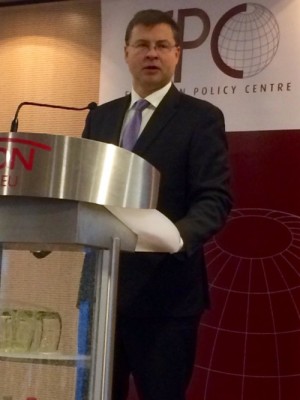At this Breakfast Policy Briefing of the European Policy Centre European Commission Vice-President Valdis Dombrovskis talked about the current steps the Commission is about to take to make the EMU a stable, more resilient system. He started his speech by mentioning that the EMU is much stronger and able to deal with financial & economic crises than it was five years ago. At that time the Stability and Growth pact was not forced as much as it would have been needed and now the Commission is working to make sure it is an important part of the EMU. He added that Member States are more aware of their macroeconomic balance now. Mr Dombrovskis underlined the role of the ECB during the 2011 crisis. The “Whatever it takes” speech by Mario Draghi showed the market that the ECB can act as a financial back stop and fortunately the ECJ confirmed the legitimacy of the ECB’s steps later. He highlighted that the crisis in Greece this summer has not started a domino effect and it shows that the EMU is able to handle their MS crises separately, without the unwanted spill-over effects. According to him, the stability of the euro area was not questioned this time.
The vice-president mentioned the Five President Report, which they have divided into two stages of actions. The first stage does not require treaty change and follows the “deepening by doing” line, while the second stage includes more fundamental actions that may require a treaty change. During the first stage, they would like to rewamp the European Semester, making it more focused on key socio-economic challenges as well as they are planning to have more consultations at the Member States’ level, not only with governments but with social actors too. He added that the macroeconomic imbalances procedure is something the Commission would like to use more forcefully in the future. They are about to set up a system of financial councils and competitiveness authorities helping the Member States with independent advices. Completing the Banking Union and the Capital Markets Union are also included in the first stage.
The second stage will start with setting up an experts group, which will draft a White Paper for 2017 that will include the steps that must be taken considering a treaty change. It could include the basics of a fiscal union with automatic stabilization function of the Eurozone. According to Mr. Dombrovskis the right balance must be found between risk-sharing, sovereignty-sharing and solidarity. Once this balance will be found all Member States have to follow the same rules. Member States feel the urgency to adapt the rules of the Eurozone to the changed conditions but there is no agreement on how to do it.

